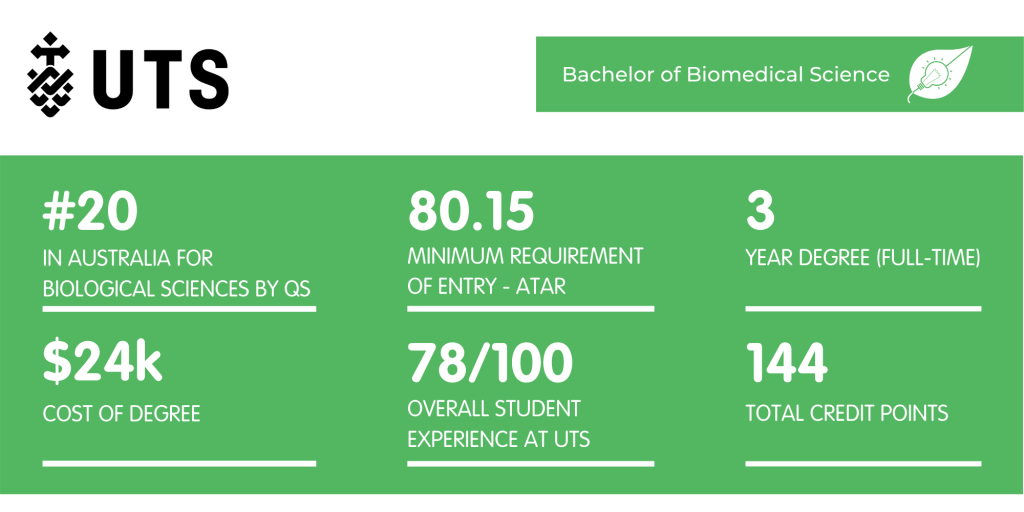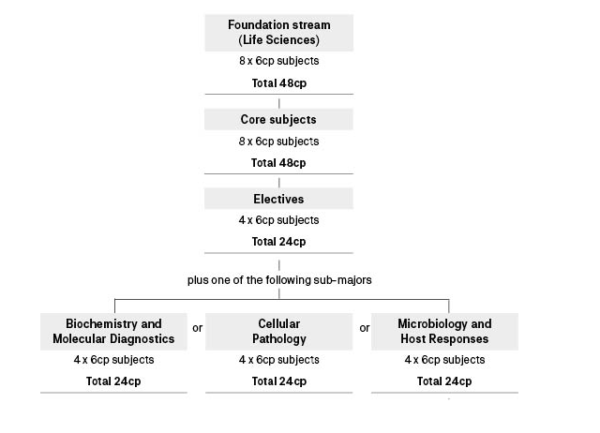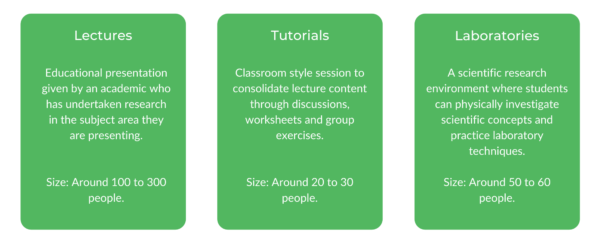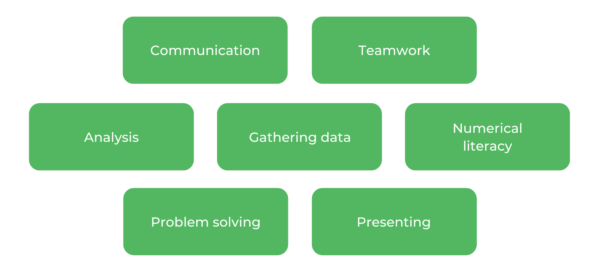Ever wondered what it’s like to study a Bachelor of Biomedical Science at UTS?
Well you’ve come to the right place! We’ve covered everything there is to know about the units, culture, assessments and what it’s really like to study a Bachelor of Biomedical Science at UTS.
Let’s get into it!
What is a Bachelor of Biomedical Science at UTS?
Core Units for this Degree
How to Get into a Bachelor of Biomedical Science at UTS
What’s the Teaching Format?
What’s the Faculty and Culture Like?
What is a Bachelor of Biomedical Science at UTS?
A Bachelor of Biomedical Science at UTS is an undergraduate degree that’ll provide you with a deep understanding of both biological and medical sciences through the development of practical skills and theoretical knowledge.
You’ll learn about the ways in which the body works at a cellular level, what causes diseases and how diseases are diagnosed. Essentially, you’ll gain the skills to assist in research aimed at preventing and treating all kinds of diseases — so you’ll be learning some pretty important stuff!
Is there an Honours program?
Once you’ve finished your undergraduate degree, UTS offers the option of completing a fourth year of scientific study through their honours program.
By completing this additional year of study, you’d graduate with a Bachelor of Science (Honours) in Biomedical Science. However, in order to be eligible, you’ll have to receive a credit average in the last two thirds of your undergraduate degree.
The main element of the Biomedical honours program is the completion of an extensive research project taking the form of either an analytical or experimental investigation. While the honours program will provide you with further experience and can provide an avenue for masters or PhD studies, it is not required!
Career Paths
By understanding the foundations of Biological and Medical sciences, you’ll develop the skills required for careers within many different fields. These can include:
-
- Hospital laboratories
- Diagnostic medical laboratories
- Pharmaceutical companies
- Biomedical and biotechnology industries
- Biomedical research
A Bachelor of Biomedical Science at UTS would also prepare you to advance your studies through degrees in medicine and allied health professions.
Core Units for this Degree
As a Biomedical Science student, your degree will consist of 144 credit points in total — 96 of which will be your compulsory core subjects. The remaining 48 credit points are divided between a 24 credit sub-major and 24 credit electives.
A credit point is basically a way to measure the workload of particular subjects. We’ll give you an idea of your core units, sub-majors and electives but if you’d like a more in-depth rundown, check out UTS’ handbook here!
First Year — Foundation Stream (Life Sciences)
A first year student in the Bachelor of Biomedical Science program at UTS is required to spend their first year completing 48 credit points in the Foundation stream, otherwise known as ‘Life Sciences’.
This is basically an introductory year to prepare you for a more in depth biomedical study in the years to come! Think of it as Biomedicine 101 where you’ll develop a strong foundational understanding in the following areas:
| Core Units | Description |
|---|---|
| Chemistry 1 | In this unit you can expect to cover a broad range of basic chemistry-related principles such as atomic structure, chemical reactions, the periodic table, bonding and molecular geometry. It also provides the requisite skills for Chemistry 2. |
| Cell Biology and Genetics | This introductory unit will provide an insight into the principles of cell biology like the structure and functions of a cell, biological molecules, theories of inheritance and genetic code. You’ll also develop your skills in utilising modern library resources to find appropriate and relevant research literature. |
| Statistical Design and Analysis | In this unit, you’ll learn to find, gather and analyse relevant data. You’ll gain practical experience in collecting samples, describing data and testing hypotheses. |
| Principles of Scientific Practice | In this unit, you’ll primarily learn about how science can formulate and address issues. You’ll obtain knowledge in inquiry-oriented experimentation and will be introduced to the scientific tools used in collecting empirical data. |
| Chemistry 2 | This subject offers a more advanced study of the topics that you’ll cover in Chemistry 1. Chemistry 2 is divided into 2 areas — physical chemistry (chemical reactions and energies) and organic chemistry (the complexity of the natural environment). |
| Biocomplexity | This topic will allow you to investigate the circumstances it takes for life to exist in a variation of different and complex habitats. You’ll learn about how humans interact with their natural environment and how other species and organisms have adapted to best suit their own environments. |
| Human Anatomy and Physiology | In this unit you’ll gain an understanding of a healthy human body’s structure and the ways in which it functions. |
| Physical Aspects of Nature | Finally, you’ll complete a unit that provides an introduction to waves and optics, motion, thermal effects and electrical and nuclear concepts. You’ll gain hands-on laboratory experience to effectively analyse experimental data. |
While it may appear intimidating, remember that the first year of a Bachelor of Biomedical Science provides an introduction to the broad range of topics that you’ll explore throughout your degree. So, it’ll be taught at a beginner level!
Second Year — Core Subjects
Your second year in the Bachelor of Biomedical Science will look a little like the first, in that the units throughout the year remain the same for everyone in the course. Once you get to third year, you’ll have a choice of what you want to specialise in.
Here are the core second year subjects:
| Core Units | Description |
|---|---|
| General Microbiology | In this second year subject, you’ll get an idea of the structure, function and taxonomy of microorganisms like bacteria, viruses, fungi and protozoa. |
| Metabolic Biochemistry | This subject will develop your understanding of cell functions, cellular metabolism and energy transfer mechanisms. You’ll also get to experience the basic tools of biochemical experimentation. |
| Histology | In this subject, you’ll add to the information you learnt in the first year topic, human anatomy and physiology. So, you’ll learn more about the tissue structure of the main systems in the human body. |
| Haematology 1 | This subject will introduce you to the basic concepts of haematology — a branch of medicine that focuses on the causes, treatment and prevention of diseases in the blood. |
| Molecular Biology 1 | This subject will introduce you to the basics of molecular biology which will develop your understanding of DNA manipulations in a lab. So, very lab-based and very practical! |
| Analytical Biochemistry | This subject will allow you to explore contemporary tools and technologies that are required in biochemical analysis. You’ll get to examine these concepts in environmental, forensic, biological and biomedical settings. |
| Epidemiology and Public Health Microbiology | By studying the distribution and causes of diseases, this subject will teach the importance of public health and basic epidemiological principles. This subject will be especially relevant in the current circumstances. |
| Immunology 1 | And finally, this second year subject will introduce you to the foundational principles of immunology — the study of the immune system. This subject will be often taught through practical sessions to explore a range of immunological techniques used in research labs and pathology. |
Third Year
In the third year of a Bachelor of Biomedical Science at UTS, you’ll spend the first semester studying electives which you can choose yourself. In your second semester, you’ll choose 1 sub-major to specialise in from the following options:
-
- Biochemistry and Molecular Diagnostics
- Cellular Pathology
- Microbiology and Host Responses
Aside from the sub-majors that you choose from in your final year, a Bachelor of Biomedical Science at UTS doesn’t offer you an opportunity to major in a particular topic. However, UTS does offer a Bachelor of Science degree where you’re able to pick a major from the following topics:
-
- Chemistry
- Applied Physics
- Biotechnology
- Biomedical Science
- Mathematics
- Medical Science
- Nanotechnology
- Statistics
- Environmental Sciences
If you’d prefer a more broad science degree, you could look into UTS’s Bachelor of Science!
Degree Structure
As we mentioned above, all students in the Bachelor of Biomedical Science degree at UTS are required to complete 48 credit points in the Foundation stream, 48 credit points in core subjects as well as a choice of electives and sub-majors. Here’s a diagram to help!
Image sourced from: UTS Handbook
Internships
While it is not compulsory for students studying a Bachelor of Biomedical Science at UTS to undertake an internship as part of their course, UTS does offer the opportunity through electives. You can enrol in an internship subject to complete credit points, receive academic merit and gain industry experience in either a UTS research laboratory or an external lab.
How to Get into a Bachelor of Biomedical Science at UTS
To get into a Biomedical Science degree at UTS, you should aim to get an ATAR of 80.15 or above. But don’t stress! There are plenty of alternative pathways that can score you a spot in the course.
You can check out UTS’ alternative admission pathways here!
Pathway Programs
While there is no pathway program that provides an avenue directly into the Bachelor of Biomedical Science, UTS does offer a Diploma of Science program which can get you into a Bachelor of Science course where you can major in Biomedical Science if that’s what you’re interested in.
You can find out more about the Diploma of Science here!
Prerequisites and Assumed Knowledge
To study a Bachelor of Biomedical Science at UTS, you’re expected to have completed Mathematics, any two units of English and any two units of Science at an HSC level.
Chemistry and Mathematics Extension 1 at an HSC level are also recommended but they’re not considered assumed knowledge. This is just so you have some prior knowledge before beginning the degree.
Remember that this is assumed knowledge and is not necessarily compulsory. If you didn’t complete the expected HSC subjects, UTS offers short intensive bridging courses for high school students who may not meet the assumed knowledge requirements.
UTS Science offers bridging courses in Maths, Physics and Chemistry which usually takes place in January and February before the academic year starts and is available to everyone even those who are not planning on studying at UTS! You can look at the bridging courses in more detail here!
Scholarships
UTS offers its Biomedical students a range of scholarships whether they’re for science students, international students or Aboriginal Australians or Torres Strait Islander students. The options are listed underneath ‘Scholarships and prizes’ on the UTS website!
What’s the Teaching Format?
A Bachelor of Biomedical Science at UTS is taught through tutorials, lectures and laboratories. You’ll undergo your studies by completing two semesters each year — with long breaks in between!
Lectures
Typically, the lectures at UTS last an hour each and you’ll have one lecture for every class you take each week. While the number may change, there will usually be around 100 to 300 students in the lecture theatre.
These lectures are also often recorded so you can consolidate your knowledge when it comes to the exam period! Lectures will inform your future tutorials so this will be your chance to get an idea of the content you’ll cover later on in the week — so it’s a perfect time to jot down some notes to prepare!
Tutorials
Tutorials are much smaller than lectures — the atmosphere is usually more conversational and student participation is encouraged. Tutorial classes are much smaller than lectures, with around 20 to 30 students in a classroom at a time.
Again, you’ll have a tutorial for each of your classes per week. In a tutorial, you’ll be able to ask questions and get to know the other students.
Laboratories
Laboratories provide students with a space to explore real word experiences in biomedicine. You’ll get to complete real experiments and research in a variety of biological and medical circumstances.
Structurally, these classes are pretty similar to tutorials so there are around 20 to 30 students in each class.
How much time do you spend at university?
While the number of contact hours generally change as you progress through your degree, a first year should expect to be on campus for at least 15 hours per week. While it may sound daunting, it’ll account for your weekly tutorials and lectures and will fly by when you’re actually there.
A full-time Biomedical Science student at UTS is expected to take 4 classes at a time, which means you’ll be there for 4 hours of lectures and 8 hours of tutorials each week. By adding a few hours for labs and a few hours for general study at the library, you can expect 15 hours to work pretty well!
Assessments
As a Biomedical Science student at UTS, your assessments will focus on both knowledge and practical skills. You’ll be graded on tests, quizzes and lab reports throughout the semester as well as final exams to consolidate everything you’ve learnt.
Skills That You Refine and Learn
A Bachelor of Biomedical Science degree at UTS will provide you with an extensive understanding of the ways in which the human body works at a cellular level, what causes diseases and how diseases are prevented and diagnosed.
Alongside the many important practical skills that you’ll develop, you’ll also gain essential communication and critical thinking skills to fully prepare you for the biomedical industry!
“I had lectures, tutorials and laboratory classes. In Biomedical Science, knowledge and practical skills are equally important. The course focuses on both because pracs are always worth 25-30% of the total grade. I developed practical skills through laboratory classes where I got to do experiments in real work situations!” — Giao Vo, Bachelor of Biomedical Science II at UTS
What’s the Faculty and Culture Like?
As a Bachelor of Biomedical Science student, you can expect to feel constantly supported by the Faculty of Science at UTS. You can find out more about the Faculty of Science at UTS here!
Since UTS’ campus is located in a bustling part of the city, you’ll always have something exciting to be a part of — whether that’s a student event, a society-organised celebration or just an outing with friends.
To form relationships with the friendly and inclusive students at UTS beyond your standard tutorials and lectures, you should definitely look into becoming a member of the endless societies that UTS has to offer. For Biomedical Science students, your best chance to meet other science fanatics would be at the Science Society!
Support Programs
There are lots of support and mentor programs that are offered at UTS — this may include academic assistance or social support. UTS has a team dedicated to assisting students in every way, you can find out about UTS’ HELPS here!
Resources
UTS prides itself on offering some of the best facilities and resources currently available, meaning you’ll be supported emotionally and practically in your scientific endeavours. UTS provides its students with access to professional technology and software and many of the laboratories at UTS are open and accessible every day of the week!
Interested in the pros and cons of this degree? Check out our article here!
Gemma Billington is a Content Writer at Art of Smart and an undergraduate student at the University of Technology Sydney. While studying Journalism and Social and Political Sciences, Gemma enjoys spending her time at the gym or reading about Britain’s medieval monarchy – ideally not at the same time. She currently creates and administers social media posts for Central News and writes for the student publication, The Comma. After completing her undergraduate degree, she hopes to study a Masters of Medieval History and is very excited about the prospect!







